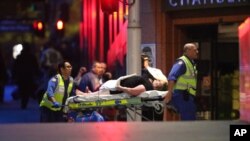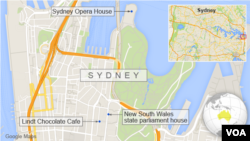Australian police have confirmed three people were killed during a daylong standoff at a Sydney cafe, including the hostage-taker.
The siege ended early Tuesday after heavily armed police stormed the cafe where a man reportedly held 17 people hostage for about 16 hours beginning Monday morning.
New South Wales police said the 50-year-old assailant, whom police sources earlier identified as Iranian immigrant Man Haron Monis, is dead.
A 34-year-old man and 38-year-old woman also were killed. Two people were hospitalized with non-life-threatening injuries, while a police officer was being treated after being hit in the face with gunshot pellets. A woman was also being treated for a gunshot wound to the shoulder, police added.
Police commissioner Andrew Scipione called the attack an "isolated incident." He said gunfire was exchanged when police entered the cafe, but he would not confirm the causes of the three deaths.
Monis is believed to have started the siege on the Lindt chocolate cafe in the city's central business district about 9:45 a.m. local time Monday. Five people escaped the cafe on Monday and another five early Tuesday, just before police stormed the cafe around 2 a.m. local time (1500 GMT on Monday). At least three more fled with help from emergency workers. Police were seen performing chest compressions on one person.
No motive determined
A police spokeswoman said the hostage-taker made contact during the standoff, but negotiators had not been able to establish a motive for his action.
Monis, a self-proclaimed Muslim cleric, was facing charges including sexual assault and accessory to murder in separate cases. He was found guilty in 2012 of sending offensive and threatening letters to the families of Australian soldiers killed overseas, according to media reports.
Local media reported that Monis had changed his name from Manteghi Bourjerdi.
Black flag displayed
Early in the crisis, hostages were seen standing with their hands pushed up against the windows. A black flag with the Islamic creed known as the Shahada written in white could be seen through the glass.
The phrase is a declaration of faith for Muslims and translates to "There is no God but Allah, and Muhammad is his messenger." Radical Islamists, including the Islamic State group, have co-opted the Shahada to use on their flags.
New South Police Commissioner Andrew Scipione on Monday refused to call the situation a terrorist act. But Prime Minister Tony Abbott said the incident at the cafe may have been politically motivated.
The cafe is in the heart of Sydney's financial and shopping district, an area packed with holiday shoppers at this time of the year.
Nearby buildings, including the U.S. Consulate in Sydney, had been evacuated. U.S. State Department spokeswoman Jen Psaki said the department had monitored the situation and accounted for all its personnel with the mission.
The New South Wales state parliament house is also just a few blocks away.
Security experts
Although Monis was well known to authorities, security experts said preventing attacks by people acting alone could still be difficult.
"Today's crisis throws into sharp relief the dangers of lone wolf terrorism," said Cornell University law professor Jens David Ohlin, speaking in New York.
"There are two areas of concern. The first is ISIS [Islamic State] fighters with foreign passports who return to their home countries to commit acts of terrorism," Ohlin said. "The second is ISIS sympathizers radicalized on the internet who take it upon themselves to commit terrorist attacks to fulfill their radical ideology.
"We are entering a new phase of terrorism that is far more dangerous, and more difficult to defeat, than al-Qaida ever was," Ohlin said.
Australia, a staunch ally of the United States and its escalating action against the Islamic State group in Syria and Iraq, earlier this year raised its domestic terror threat level from medium to high, mainly because of concerns about home-grown extremists.
About 70 Australians are thought to be fighting for militant groups in the Middle East.
In September, Australia’s largest counterterror raids took place in Sydney and Brisbane. One person was charged with terror offenses.
Tough anti-terror laws were passed by the Australian parliament in October in response to the threat of homegrown extremism.
Phil Mercer contributed to this report from Sydney. Some material for this report came from Reuters, AFP and AP.





